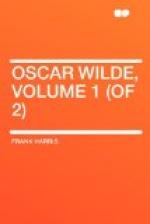“The Portrait of Mr. W.H.” did Oscar incalculable injury. It gave his enemies for the first time the very weapon they wanted, and they used it unscrupulously and untiringly with the fierce delight of hatred. Oscar seemed to revel in the storm of conflicting opinions which the paper called forth. He understood better than most men that notoriety is often the forerunner of fame and is always commercially more valuable. He rubbed his hands with delight as the discussion grew bitter, and enjoyed even the sneering of the envious. A wind that blows out a little fire, he knew, plays bellows to a big one. So long as people talked about him, he didn’t much care what they said, and they certainly talked interminably about everything he wrote.
The inordinate popular success increased his self-confidence, and with time his assurance took on a touch of defiance. The first startling sign of this gradual change was the publication in Lippincott’s Magazine of “The Picture of Dorian Gray.” It was attacked immediately in The Daily Chronicle, a liberal paper usually distinguished for a certain leaning in favour of artists and men of letters, as a “tale spawned from the leprous literature of the French decadents—a poisonous book, the atmosphere of which is heavy with the mephitic odours of moral and spiritual putrefaction.”
Oscar as a matter of course replied and the tone of his reply is characteristic of his growth in self-assurance: he no longer dreads the imputation of viciousness; he challenges it: “It is poisonous, if you like; but you cannot deny that it is also perfect, and perfection is what we artists aim at.”
When Oscar republished “The Picture of Dorian Gray” in book form in April, 1891, he sent me a large paper copy and with the copy he wrote a little note, asking me to tell him what I thought of the book. I got the volume and note early one morning and read the book until noon. I then sent him a note by hand: “Other men,” I wrote, “have given us wine; some claret, some burgundy, some Moselle; you are the first to give us pure champagne. Much of this book is wittier even than Congreve and on an equal intellectual level: at length, it seems to me, you have justified yourself.”
Half an hour later I was told that Oscar Wilde had called. I went down immediately to see him. He was bubbling over with content.
“How charming of you, Frank,” he cried, “to have written me such a divine letter.”
“I have only read a hundred pages of the book,” I said; “but they are delightful: no one now can deny you a place among the wittiest and most humorous writers in English.”
“How wonderful of you, Frank; what do you like so much?”
Like all artists, he loved praise and I was enthusiastic, happy to have the opportunity of making up for some earlier doubting that now seemed unworthy:
“Whatever the envious may say, you’re with Burke and Sheridan, among the very ablest Irishmen....




